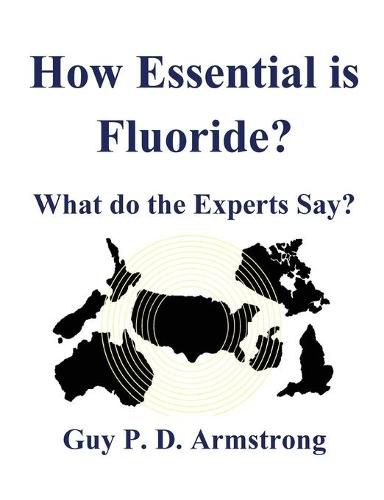Readings Newsletter
Become a Readings Member to make your shopping experience even easier.
Sign in or sign up for free!
You’re not far away from qualifying for FREE standard shipping within Australia
You’ve qualified for FREE standard shipping within Australia
The cart is loading…






This title is printed to order. This book may have been self-published. If so, we cannot guarantee the quality of the content. In the main most books will have gone through the editing process however some may not. We therefore suggest that you be aware of this before ordering this book. If in doubt check either the author or publisher’s details as we are unable to accept any returns unless they are faulty. Please contact us if you have any questions.
What Do The Experts Say?
And just as importantly What do they NOT say?
This book argues that experts have consistently exaggerated in their claim that fluorine should be considered an essential element for humans and suggests reasons why.
Expert focus on fluorine has detracted from the importance of elements and compounds that are definitely essential in the growth of teeth. In 2017 Guy Armstrong spent six months in the New Zealand Health Department archives looking through the fluoridation files of the 1950s. This has given his work a unique aspect which makes it very relevant to countries with F added to their public water supply.
A number of countries have been under the influence of American expertise and under the influence of the pervasive bias he shows. Any reader with a basic interest in science and health will be fascinated by this comprehensive account.
Media have consistently reported poorly on the fluoridation issue, partly because they did not want to be abused. This book looks at some very detailed aspects of expert and media interaction and behaviour, notably the presupposition of objectivity which allows the quoting of experts while disclaiming any responsibility to point out contradictions, and not ask uncomfortable or even obvious questions, when an evidence-based attitude would suggest this acceptable.
This book will help journalists, city councillors and the public understand not only the exaggeration of essentiality but the reasons behind it. The role of the sugar, aluminium and toothpaste industries are explored. The public relations industry has a presence here.
Contains six chapters, many sub-chapters, a detailed reference section, nine appendices, and an index.
I can also happily announce that finally an ebook is available!
$9.00 standard shipping within Australia
FREE standard shipping within Australia for orders over $100.00
Express & International shipping calculated at checkout
This title is printed to order. This book may have been self-published. If so, we cannot guarantee the quality of the content. In the main most books will have gone through the editing process however some may not. We therefore suggest that you be aware of this before ordering this book. If in doubt check either the author or publisher’s details as we are unable to accept any returns unless they are faulty. Please contact us if you have any questions.
What Do The Experts Say?
And just as importantly What do they NOT say?
This book argues that experts have consistently exaggerated in their claim that fluorine should be considered an essential element for humans and suggests reasons why.
Expert focus on fluorine has detracted from the importance of elements and compounds that are definitely essential in the growth of teeth. In 2017 Guy Armstrong spent six months in the New Zealand Health Department archives looking through the fluoridation files of the 1950s. This has given his work a unique aspect which makes it very relevant to countries with F added to their public water supply.
A number of countries have been under the influence of American expertise and under the influence of the pervasive bias he shows. Any reader with a basic interest in science and health will be fascinated by this comprehensive account.
Media have consistently reported poorly on the fluoridation issue, partly because they did not want to be abused. This book looks at some very detailed aspects of expert and media interaction and behaviour, notably the presupposition of objectivity which allows the quoting of experts while disclaiming any responsibility to point out contradictions, and not ask uncomfortable or even obvious questions, when an evidence-based attitude would suggest this acceptable.
This book will help journalists, city councillors and the public understand not only the exaggeration of essentiality but the reasons behind it. The role of the sugar, aluminium and toothpaste industries are explored. The public relations industry has a presence here.
Contains six chapters, many sub-chapters, a detailed reference section, nine appendices, and an index.
I can also happily announce that finally an ebook is available!